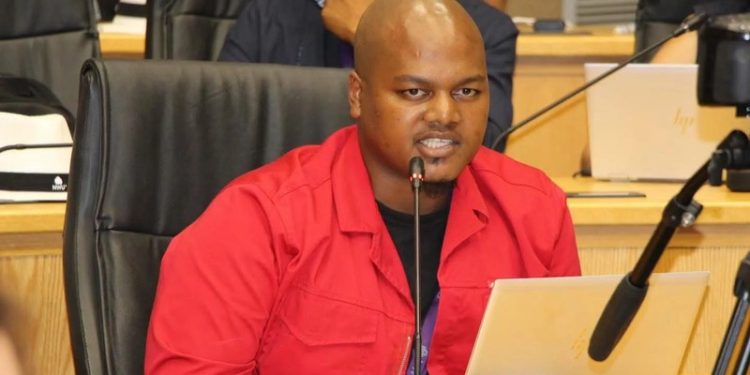Economic Freedom Fighters (EFF) Member of Parliament Sihle Lonzi, who also serves as president of the party’s Student Command, has strongly criticised Deputy Minister in the Presidency for Women, Youth, and Persons with Disabilities Mmapaseka Steve Letsike. He accused her of misapplying constitutional principles in her response to controversial remarks made by podcaster Macgyver “MacG” Mukwevho.
Taking to X (formerly Twitter), Lonzi dismissed Letsike’s approach as misguided, stating: “This ANC Minister is CLOWNING. There are three SEPARATE arms of the State: the Executive, the Legislature (Parliament), and the Judiciary. A Minister, representing the Executive, cannot ‘summon’ anyone to Parliament. If you are going to grandstand, at least be smart about it!”
The backlash follows widespread condemnation of MacG’s comments on his popular Podcast and Chill show, where he crudely speculated about media personality Minnie Dlamini’s past relationships, remarking, “maybe her coochie smells or something.”
Deputy Minister Letsike condemned the remarks as “nauseating in its vulgarity” and a form of online gender-based violence. “This incident is not a harmless joke or casual banter – it is a harrowing demonstration of online gender-based violence,” she said.
She vowed to escalate the matter to regulatory bodies, including the Commission for Gender Equality and the South African Human Rights Commission, while exploring legal action under the Cybercrimes Act and the Prevention and Combating of Hate Crimes and Hate Speech Act.
“Women cannot be reduced to vulgar slurs and the objectification of the female body. This is a damaging reinforcement of gender-based disrespect and, consequently, violence,” Letsike added.
Parliament Weighs In on Podcast Regulation
Meanwhile, Parliament’s Portfolio Committee on Communications has raised concerns about the largely unregulated podcasting industry in South Africa. Committee Chairperson Khusela Diko told SABC News that outdated laws fail to address modern digital content challenges.
“In South Africa, over 3.2 million people engage with podcasts weekly—that’s the size of our biggest radio stations,” Diko noted. “Yet we operate under laws like the Broadcasting Act of 1999 and the Electronic Communications Act of 2005, which were drafted long before today’s digital landscape.”
Diko stressed that regulation should not be seen as censorship but as a necessary balance between freedom of expression and protecting dignity and privacy.
“Our constitution guarantees freedom of speech but also the rights to dignity, equality, and privacy. Regulation provides a framework to navigate these tensions responsibly,” she explained.
The committee has called on the Department of Communications to fast-track the long-delayed audiovisual policy, which would bring digital content creators under oversight mechanisms similar to those governing traditional media.
“This isn’t about stifling creativity,” Diko clarified. “It’s about ensuring ethical boundaries that protect both creators and the public.”
Broader Implications
The debate highlights growing tensions between free speech, digital content regulation, and gender rights in South Africa. While Letsike’s stance reflects government efforts to combat online misogyny, Lonzi’s critique underscores concerns about executive overreach into legislative functions.
As the discussion unfolds, the call for updated regulations may shape the future of South Africa’s rapidly expanding podcasting industry—and the boundaries of acceptable discourse in the digital age.






















